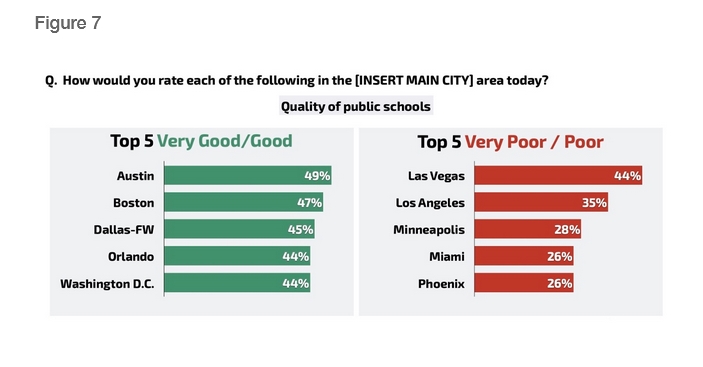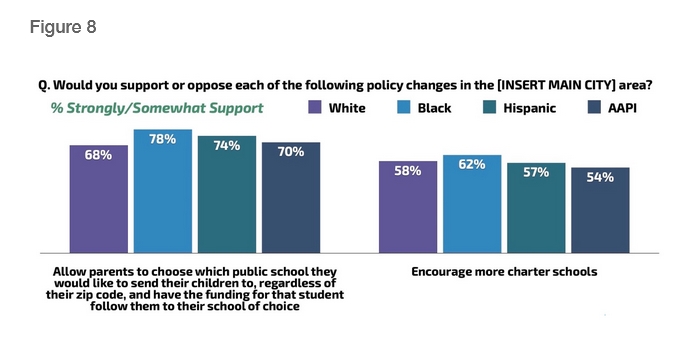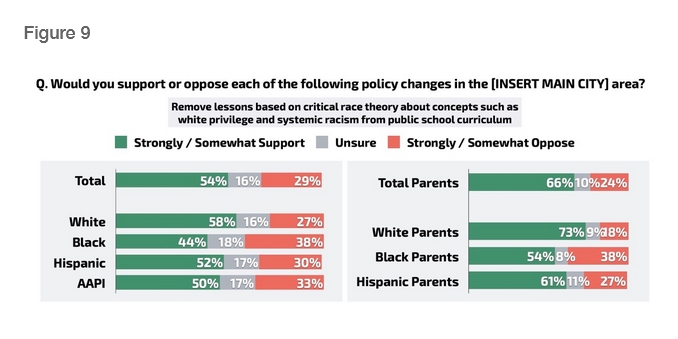New Poll Says Overwhelming Number Of Parents Support Removing CRT Ideas From Schools
to get a better understanding of priorities, concerns, and opinions. They surveyed adults in 20 metropolitan areas that have shown the largest population growth in a ten-year span covering 2010 through 2019.
The Manhattan Institute recently teamed up with Echelon Insights to conduct a survey to get a better understanding of priorities, concerns, and opinions. They surveyed adults in 20 metropolitan areas that have shown the largest population growth in a ten-year span covering 2010 through 2019. While the survey touched on a number of important topics, education, and more importantly critical race theory (CRT), resulted in some surprising numbers.
As you can see by the image below, the survey included some big metropolitan areas. They represent a large variety of ethnicities, ideologies, and financial standing. It was clear that housing costs and homelessness were two major concerns as two-thirds of the respondents claimed these issues deserve much more attention. But jumping to education, the respondents made their opinions perfectly clear.

The first part of the education portion was not CRT-centered. Instead, it spoke about the quality of public schools in each metro area. The question – “How would you rate each of the following in the [Insert Main City] area today?”
The top five were led by Austin, Texas, which received a 49% very good/good rating by its residents. Boston, Dallas-Fort Worth, Orlando, and Washington, D.C. followed respectively. The bottom five, in terms of the quality of public schools, may not come as a shock. Las Vegas led the way with 44% saying the area schools are very poor/poor. Following Las Vegas is Los Angeles, Minneapolis, Miami, and finally Phoenix.

The second part of the education portion of the survey also didn’t include the CRT issue, but instead spoke on school choice, another major issue surrounding parents. The main question here was if “parents would support or oppose each of the following policy changes in the [Insert Main City] area.” One of the policy changes the Manhattan Institute survey was curious about was allowing “parents to choose which public school they would like to send their children to, regardless of their zip code, and have the funding for that student follow them to their school of choice.” The results were broken down into ethnicities. 68% White favor this policy change. 78% Black were also all in on it while 74% Hispanic gave it a thumbs up.

The final survey question under the education banner did speak to the CRT issue being seen across the public education landscape. Of course, to some, there is no issue and if you talk to the many educators, as well as the powerful teacher’s unions, CRT is not being taught in classrooms. At this point though, those claims seem to be untrue and some teachers unions have even admitted that teaching CRT ideology is their goal.
The question posed – “Would you support or oppose each of the following policy changes in the [Insert City] area” – got right down to the CRT nitty-gritty. The policy change in question was, “Remove lessons based on critical race theory about concepts such as white privilege and systemic racism from public school curriculum.”
The results were broken down into: Strongly/somewhat support, Unsure, and Strongly/somewhat oppose. It was also broken down by ethnicity. Overall, more than half the parents of all races surveyed strongly favored removing these CRT elements from schools. 54% were in favor, 16% were unsure, and 29% opposed such a move.
Individually, 58% of Whites wanted to see CRT gone, 16% were unsure, and 27% said keep it in. 44% Black were in favor while 18% were unsure and 38% said it should stay. Finally, 52% of Hispanics also favored the removal of those divisive elements from public schools, 17% were unsure, and 30% were for keeping it.

Teacher’s unions and a number of teachers have thrown major support behind keeping CRT in schools, while the power of the parents is starting to rise and speak out. Parents have reached enough ears, important ears, that change is on its way. Numerous anti-CRT bills have been brought forth to lawmakers and many are moving forward.



